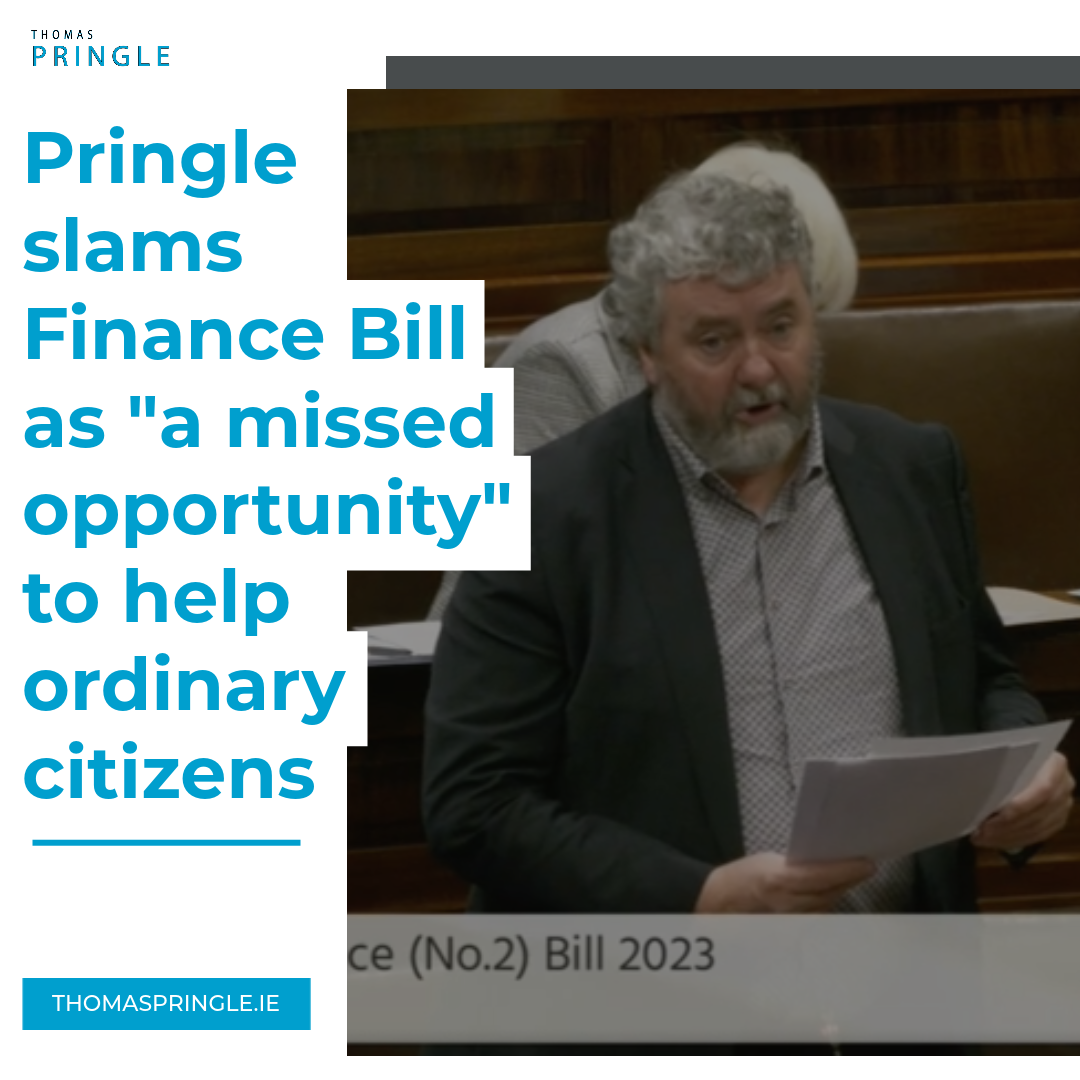- Pringle: We need a policy that recognises the importance of inshore fishing
- Pringle: Disabled people and carers face crisis of State neglect
- Pringle: Failed FF/FG housing policies forcing people to put their lives on hold
- Pringle welcomes Donegal council motion on Occupied Territories Bill: ‘We cannot stand by in the face of genocide’
Pringle: Finance Bill does very little for ordinary citizens
- Updated: 25th October 2023

Independent TD for Donegal, Thomas Pringle, said the Finance Bill does very little for ordinary citizens, as he outlined a number of things the Government could do to make life easier for people.
Addressing the Dáil on Tuesday, Deputy Pringle said: “There are many simple things the government could implement to make life much easier for ordinary people, especially during this cost-of-living crisis. One example is for cohabitating relationships. People who have dependents and can prove long-term relationships should be allowed to be assessed through the revenue system the same way that married couples are.
He said: “It is only right that the revenue system reflects modern-day Ireland and allows cohabitating couples to share tax credits and increased rate bands.”
The deputy was addressing Finance (No. 2) Bill 2023 on Tuesday evening.
Deputy Pringle said the bill also missed an opportunity to abolish the TV licence.
He said: “Many of the public have been calling for this, particularly since the summer. The payment is unfair and unequal. It makes no sense that people are forced to pay the same amount of €160 no matter what income they have and no matter what their financial situation.”
He said TV licences should be funded by general taxation to ensure fairness.
Deputy Pringle said: “The government should be introducing more targeted measures in order to reach those who actually need help and assistance during this cost-of-living crisis.
“There are many areas in this legislation where this is severely lacking. For example, mortgage interest tax relief, which is being introduced on a one-year basis for individuals holding mortgages between €80,000 and €500,000. I have said many times that one-off payments do not work. The mortgage interest tax relief is not a targeted measure, and although many will benefit from this tax relief, many will also not require it.
“This is a massive waste of public funds. Just like the electricity allowance, it may reach some that need it, but millions will also be wasted on those who don’t.”
He said he was also surprised at the decision to remove ready-to-pour concrete, used in the manufacture of precast concrete products, from the scope of the Defective Concrete Products Levy.
The deputy said: “The government needs to admit the fact that they, on behalf of the Irish people, are the cause of the defective concrete problem with their light-touch regulation, and the people who are victims of this should not have to pay for Government’s negligence.”
Deputy Pringle said the introduction of a 15% minimum corporation tax rate to apply to multinational and domestic businesses with a global annual turnover of €750 million in at least two of the preceding four tax years, “will only be effective if the multinational businesses are forced to pay this rate and aren’t given any exemptions. But we know that they will be.”
He said it seemed a common occurrence that while domestic businesses pay the full percentage of corporation tax, many multinationals do not, calling that “completely unacceptable”. He said: “If we made sure that companies paid the 12.5% rate rather than increasing corporation tax, we would raise billions upon billions more in funding that could be used for everybody.”
He also asked how the 50% back on rates will be implemented for small businesses and asked whether conditions will be applied to the film tax credit to require film companies to treat workers properly.
Deputy Pringle said: “The budget has supposedly been full of measures to help small businesses and to help people. I don’t think it has.
“I think it’s plain to be seen and we will see a lot of businesses will struggle over the next year as well and that’s a shame because we really need to maintain and keep those small businesses going because that’s what’s keeping rural Ireland going,” he said.



